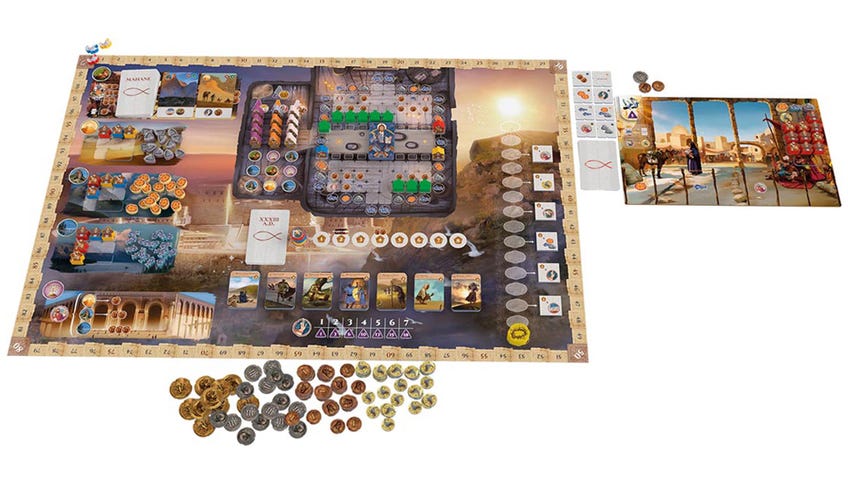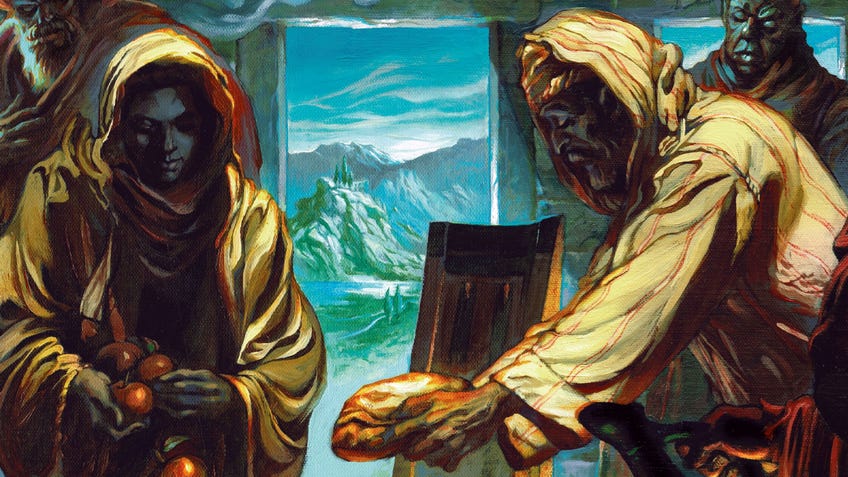Board games shouldn't always be about escapism
To be not escapist, but free.
Wingspan’s a curious revelation - curious because it bears few hallmarks of board game stardom. It doesn’t introduce novelties in cards and dice or a new, more accessible connection to those novelties. It neither invented deckbuilding like Dominion nor popularised worker-placement like Lords of Waterdeep. Its production, while excellent, conformed to expectations. Wingspan enchanted people because it showed affection for the mundane, a word too often associated with boredom when it simply means ‘earthly,’ of the mundus.
Most games offer to transport you to a beloved IP, new universes, unfamiliar eras, an office or a crime scene. Wingspan, like a madrigal, dwelt on a simple, everyday beauty and translated it into games’ language. It was about observation, not enterprise. No, it wasn’t the first to do so: similar fare like Morels preceded it. Designers went there, but the market never followed in such lucrative numbers.
Lately, the market’s been giving chase. Last December, kiosks at PAX Unplugged overflowed with games about animals, nature, worldliness and even religion. The same industry that made Settlers of Canaan, Sunday School copy of Catan, couldn’t have made Ierusalem: Anno Domini. In Ierusalem, players compete to sit closer to the right hand of Christ at the Last Supper. Illuminated by a lush production from publisher Devir, Ierusalem textures and colours a religious pilgrimage with the sophisticated techniques board games have developed. Strip away the beautiful, Byzantine-styled artwork and you still feel like you’re pushing to get into a room with a special someone inside. It quotes Scripture in its rulebook to show its homework.
That texture and colour doesn’t form any conclusion, positive or negative, about theology or salvation. Ierusalem picked one of the most divisive themes imaginable within one of the most divisive subjects imaginable. The mere prepositions used to describe the Eucharist - in, with, and under - can separate a Catholic from a Lutheran, yet this depiction’s agnostic to anything except a mild suggestion that Jesus existed.
On the one hand, to see believers and non-believers (like myself) of any stripe play Ierusalem warms the heart. Togetherness and gaming. What could be more agreeable? On the other hand, this concord depends on how well designer Carmen Garcia Jimenez can mask her own faith. Real-world curiosity doesn’t extend to opinions.
In exchange for a dialogue, games have been asked to give up their tongue.
Games make real-world opinions, of course, and then ignore them or even unmake them. Agricola and its spiritual sequel Caverna, both smash hits and farming simulations by Uwe Rosenberg, have diametrically opposed viewpoints. Agricola’s human peasants starve and beg. Caverna’s dwarf ‘cave farmers’ do not. In general, modern farming sims like Fields of Green or Fields of Arle follow Caverna’s example.
The choice to omit or include suffering in rural life puts them smack dab in the middle of a centuries-long debate about how good farmers have it. Virgil and Thomas Jefferson penned odes to farmers. Steinbeck tore that down and portrayed them as low, hardscrabble creatures. Whether or not a game sides with Virgil or Steinbeck isn’t the issue here; they’re in good company either way. The issue is that we don’t plug them into ideas adjacent to ‘highbrow culture.’ They’re air-gapped.

So, common wisdom about games arbitrates difficulty, how starvation hardens or softens mechanisms, and the rest dies on the table. We salvage fantasy from reality.
‘Highbrow culture’ must admit some fault. In exchange for a dialogue, games have been asked to give up their tongue. Concerns about ‘play,’ about games that eschew it and flatten into something more like a text, merit disappointment. ‘Play isn’t productive,’ but play is the spirit of the game, its noun and its verb.
Consider Train, a vision of “productive, mature gaming” lauded by critics in 2009. A museum piece designed to teach children about the Holocaust (how productive), Train has a bog-standard Parker Brothers ruleset of rolling dice and take-that cards paired with a third-act twist. On the second-to-last round, players are informed that the trains they’re loading are headed to Auschwitz.
As a game, it’s studiously illiterate. It’s interested in its civilising mission and begrudges the medium it inhabits. The lack of interest in the techniques, textures or colours of its art form is depressing. Due to games like Train and Holding On: The Troubled Life of Billy Kerr, in which players record the memoirs of a dying patient, people have drawn a negative correlation between mundane ambitions and the amount of gameplay they’ll get.

A game’s mission doesn’t forgive its lack of fluency. Spielberg, Mel Brooks and Elie Wiesel never apologised for playing with the camera, slapstick or the pen. They tackled the same material as Train. Schindler’s List, The Producers and Night display a love of their medium’s native language. They don’t consider fun in their medium and messaging to be incompatible.
Whether the offender’s a gamer suppressing commentary or an ambassador promoting it, the fault’s the same: a lack of faith in the language. Why? It’s a language that’s pre-verbal, intraspecies, and older than the written word. It lets anyone from any walk of life participate and innovate, which is why so much of its history passes in and out of record. Why does it harbour the adolescent self-doubt that prompts us to say, “Games are a maturing medium”?
While we’ve dropped the notion that games are for waste and wastrels, we still treat them as a phase.
Because while we’ve dropped the notion that games are for waste and wastrels, we still treat them as a phase. We’re not thinking about gaming for a whole lifetime. Books, movies, music, etc. have youth products. Games are a youth industry. Like acne cream and hair plugs, they’re a balm for insecurities and uncertainty.
To be sure, we all need those sometimes, but it shouldn’t be everything board game money will buy. To let self-awareness chew at the guts like this sounds like high school all over again.
Teens. They think that adulthood will ‘happen’ to them and awkwardness will disappear. But it won’t go away. Neither will acne, for that matter. You just get better at living with it and, as it diminishes, curiosity will overtake it. You’ll regret what’s left unsaid and not fear what may be said, no matter how imperfect the language. The mundane and the people within it will become a privilege experienced once. You’ll feed the birds and find them magical enough.

